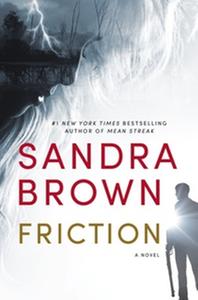
|
|
| photo: Andrew Eccles | |
Sandra Brown is a past president of the Mystery Writers of America and the author of 77 books--more than 60 of which have been New York Times bestsellers. Her latest, Friction (Grand Central, August 2015), is a suspense story centered on Crawford Hunt, a Texas Ranger involved a custody battle that becomes ever more dangerous. Brown is a life-long Texan who lives in Arlington with her husband, Michael Brown.
On its surface, Friction is about a Texas Ranger fighting for custody of his daughter who finds himself at the center of a courtroom shooting that jeopardizes his chances. He's also involved romantically with a family court judge. Beyond a straight summary, what would you say Friction is about?
I think it's about choices.
I wanted to do a book about a man trying to get custody of his child. In Friction, it's a man who in most every way is a great father, but then his job is the one obstacle that makes people raise their eyebrows and say, "Can he do this, as well-intentioned as he is?" Then he's thrust into this courtroom shooting, and from then on, everything he has to do makes his position in his custody case worse.
I thought that was a good dynamic around which to build a story, because he's forced to constantly make tough choices--choices that reinforce others' objections to his gaining custody of his daughter, but ones he must make because he is duty-bound and honor-bound to do everything in his power to catch the bad guys.
There were several moments in Friction where I was convinced I knew exactly where the story was going, and then something twisted and the story went in a new direction.
I work hard at those! I know the pivotal points in the story when I'm going to put a spin on something or make a sharp hairpin turn in the plot, making everything suddenly different than a few pages ago. All of those things are thought out, but by the same token, some of the best surprises in any of the books I've written are ones I never saw coming. It's like somebody else is in charge and is pulling the twists on me.
Do you find writing such a fast-paced novel as head-spinning and heart-thumping as reading one?
It takes a long time to work in all those twists and turns. But sometimes when I know a scene is coming up--a scene of great tension, or suspense, or when something really terrible happens--I get viscerally involved. My heart starts thumping, my palms start sweating. I get as involved as I hope the reader will. On those days, it's like my fingers can't type fast enough; I know what's going to happen and I just can't wait to get there.
 Part of what makes Crawford Hunt such an interesting and compelling character is his penchant for bending the rules--though he always does so for the right reasons.
Part of what makes Crawford Hunt such an interesting and compelling character is his penchant for bending the rules--though he always does so for the right reasons.
Crawford wouldn't have been nearly as interesting if he played by the rules all the time. To me, a really perfect character would be boring. We like to see our heroes stumble and bumble, because then when they are triumphant we can celebrate that triumph.
If you know that all of his or her choices are going to be good ones, then why bother with the story? Story by nature, as fiction, as myth, has to be a constant challenge for the hero. It can be the challenge of the elements; it's almost always the challenge of another character; and often (and I find the best books fit this) are those in which a hero's greatest challenges come from his own conscience.
I always try to make my characters a little bit edgy. If you blow on them one bit, they might just topple over into the other side.
What drew you to the location for Friction?
It could have been set anywhere, but I wanted Crawford Hunt to be a Texas Ranger. Of course, there's such lore around them, and they're so limited in number now (there are only 180 across the whole state of Texas, which covers 700,000 square miles and 254 counties). They have total autonomy, and jurisdiction anywhere in the state. They can initiate an investigation into anything without invitation.
So it was interesting to make Crawford just a little bit different than your average detective or cop, to give him a little extra oomph as the hero.
Friction is described as a mystery but has an element of steamy romance. What's it like writing a book that crosses between genres?
To me, there never really was a division between the two genres. It's just when I started writing more mystery/suspense/thriller, whatever you want to call it, I naturally incorporated the romantic element into the story.
Recently, romantic suspense has carved out its own niche as a genre. So I and many of my colleagues have had to more or less define what sets it apart, what makes it different. Romance heightens the suspense of a story, because you have given the characters a new reason to struggle. And suspense heightens the romance, because you're never as afraid as you are when someone you care about is threatened. There's a symbiotic relationship between romance and suspense, and it heightens the stakes of both to combine them.
Texas Monthly once called you one of the "masters of escapist American pop fiction." Do you think of your novels as escapist?
The term "escapist" was applied so often when I was writing romances, almost as a derogatory term aimed not at me so much as the reader. It implied that the reader was seeking and in some way needed this escapism. And those were basically women readers, so it came across as, "Poor things, they need this." Why is escape such a bad thing for women readers?
So I don't know that I would ever use the word escapist, but I rather like word entertainment, because that's why I read. I don't read to escape my life; I like my life. But I do like to visit other people's lives, and the lives and worlds of the characters that other writers create. When I set out to write, I always think in terms of entertainment. I like the term entertainment applied to Sandra Brown novels: when you get in one, you're going to have a heck of a good time. –Kerry McHugh, blogger at Entomology of a Bookworm

